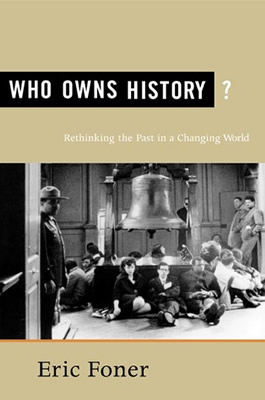 Who Owns History? Rethinking the Past in a Changing World
Who Owns History? Rethinking the Past in a Changing World
Farrar, Straus & Giroux , 2002
Agent: Sandra Dijkstra
"Who Owns History? testifies to Eric Foner's lifelong personal commitment to writing histories that advance the struggle for racial equality and economic justice." --David Glassberg, The Sunday Star-Ledger
History has become a matter of public controversy, as Americans clash over such things as museum presentations, the flying of the Confederate flag, and reparations for slavery. So whose history is being written? Who owns it?
Eric Foner answers these and other questions about the historian's relationship to the world of the past and future in this provocative, even controversial, study of the reasons we care about history, or should.
Reviews:
“A writer and scholar with the rare ability to present complex ideas in a clear and engaging manner.”
—Steven J. Ross for Los Angeles Times
“Eric Foner…assembles a set of essays primarily taken from events in his life over the past decade…including accounts of his experience in two societies grappling with deep historical change, Russia and South Africa. All investigate the relationship between the historian and his or her world…Who Owns History? stands as an argument for public engagement, and touches on issues such as globalization, social reconciliation and national identity.”
—The Nation
“Foner displays an amazing breadth of knowledge, but the real joy here is his accessibility. Anyone can read these pieces, written in clear, generous prose…like any good teacher, he winds up creating new questions instead of answering the old…A lucid antidote to the sensationalist histories currently en vogue.”
—Kirkus Reviews
“In Who Owns History?, a collection of nine previously published essays, Foner moves adroitly from personal history to reconstituting global history in post-apartheid South Africa and in Russia after the collapse of the Soviet Union. His overarching theme is that history is ‘a constantly evolving, never-ending journey of discovery.’ Foner views American history through a prism of race, and he is at his most persuasive when elucidating the ‘continuing racial dilemmas of our society’ in an analysis of how blacks have been mistreated by constitutional law and Supreme Court decisions. The most accessible piece is a biographical sketch. Foner’s father and uncle were historians at City College in New York until both were dismissed in an anti-Communist purge. Foner movingly describes being raised in a family devoted to ‘challenging prevailing stereotypes and black history,’ whose circle of friends included W.E.B DuBois and Paul Robeson."
—New York Times Book Review